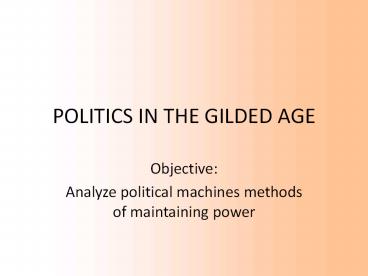POLITICS IN THE GILDED AGE - PowerPoint PPT Presentation
1 / 15
Title:
POLITICS IN THE GILDED AGE
Description:
POLITICS IN THE GILDED AGE Objective: Analyze political machines methods of maintaining power POLITICAL MACHINES During late 1800 s, many cities run by a Political ... – PowerPoint PPT presentation
Number of Views:1463
Avg rating:3.0/5.0
Title: POLITICS IN THE GILDED AGE
1
POLITICS IN THE GILDED AGE
- Objective
- Analyze political machines methods of maintaining
power
2
POLITICAL MACHINES
- During late 1800s, many cities run by a
Political machine. - This was an organized group, headed by a city
boss, that controlled activities of a political
party in a city.
3
ROLE OF THE POLITICAL BOSS
- The Boss (typically the mayor)
- controlled jobs
- business licenses
- influenced the court system
- Precinct captains and ward bosses were often 1st
or 2nd generation immigrants - helped immigrants with
- naturalization
- Jobs
- housing
- in exchange for votes
Boss Tweed ran NYC
4
Many Political Bosses were Corrupt
- HOW corrupt were they?
5
GRAFT
- Many Bosses got rich through GRAFT-the illegal
use of political influence for personal gain. - To win elections, some filled the list of
eligible voters w/names of dogs, children, the
dead.
6
CIVIL SERVICE VS. PATRONAGE
- Patronage- Giving of government jobs to people of
the same party who had helped a candidate get
elected. - Civil Service- Government jobs.
- Reformers called for a merit system. Civil
service jobs would go to the most qualified,
regardless of political views.
7
PENDLETON CIVIL SERVICE ACT OF 1883
- Created a civil service commission to give
government jobs based on merit, not
politics.Helped to reform civil service.
8
CIVIL SERVICE REPLACES PATRONAGE
- Nationally, some politicians pushed for reform in
the hiring system - The system had been based on Patronage giving
jobs and favors to those who helped a candidate
get elected - Reformers pushed for an adoption of a merit
system of hiring the most qualified for jobs - The Pendleton Civil Service Act of 1883
authorized a bipartisan commission to make
appointments for federal jobs based on
performance
Applicants for federal jobs are required to take
a Civil Service Exam
9
KICKBACKS
- Workers on city construction projects would
charge a higher price then kick back part of
the fee to the bosses. - Bosses also taking bribes from businesses in
return for allowing illegal or unsafe activities.
10
MUNICIPAL GRAFT AND SCANDAL
- Some political machines used fake names and voted
multiple times to ensure victory (Vote early and
often) called Election fraud - The fact that police forces were hired by the
boss prevented close scrutiny
11
BOSS TWEED TAMMANY HALL
- William Marcy Tweed, a.k.a. Boss Tweed, one of
the most powerful political bosses. - Became head of Tammany Hall, New York Citys most
powerful Democratic machine.
12
THE TWEED RING SCANDAL
- Between 1869-1871, Tweed led the Tweed Ring, a
group of corrupt politicians, in defrauding the
city - Tweed was indicted on 120 counts of fraud and
extortion - Tweed was sentenced to 12 years in jail
released after one, arrested again, and escaped
to Spain
Boss Tweed
13
Fraud
- systematically plundered New York City
- estimated at between 30 million and 200
million. - (that would be worth between 365 million and
2.4 billion today)
14
Fraud
- The record for brassiness goes to Boss William
Tweed, - swindled New York out of a fortune
- Tammany Hall in the 1860s and 1870s.
- Tweeds masterpiece of graft was a chunky
three-story courthouse in Lower Manhattan
originally budgeted at 250,000. - City had spent more than 13 million
- The building was still not finished.
15
Fraud
- By 1870, the Tweed ring was able to milk the city
through such devices as faked leases, padded
bills, false vouchers, unnecessary repairs, and
overpriced goods and services bought from
suppliers controlled by the ring. - Examples of the flagrant abuse of the publics
money were - 1) 40 old chairs and three tables 179,792.60
- (about 2 million today)
- 2) Repairing fixtures 1,149,874.50 (about 14
million today) - 3) A plasterer's wages during a nine month
period 2,870,464.06 (about 34 million today) - 4) 30 months of advertising paid to a
Tweed-controlled printing company 7,168,212.23
(about 87 million today)































